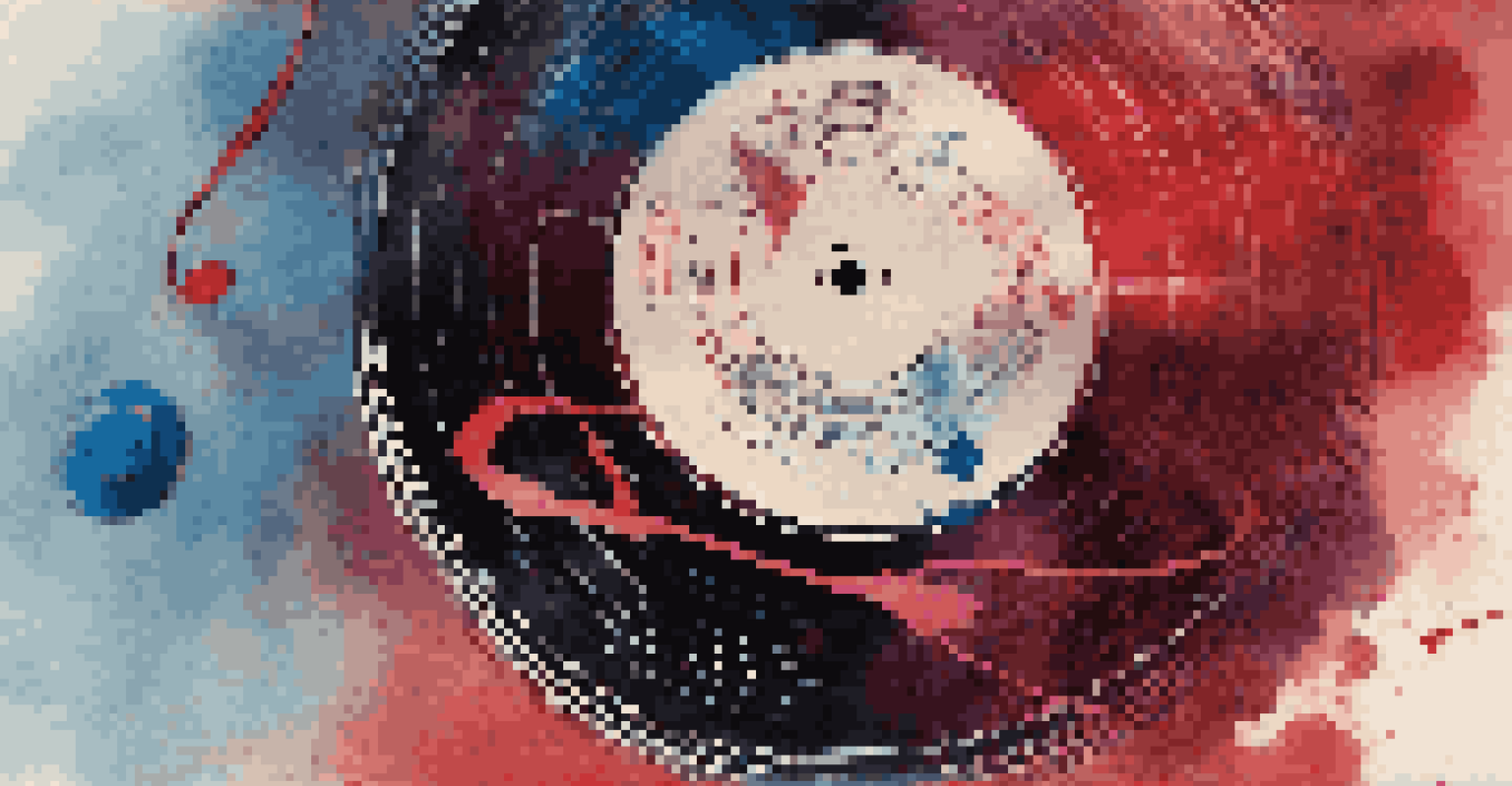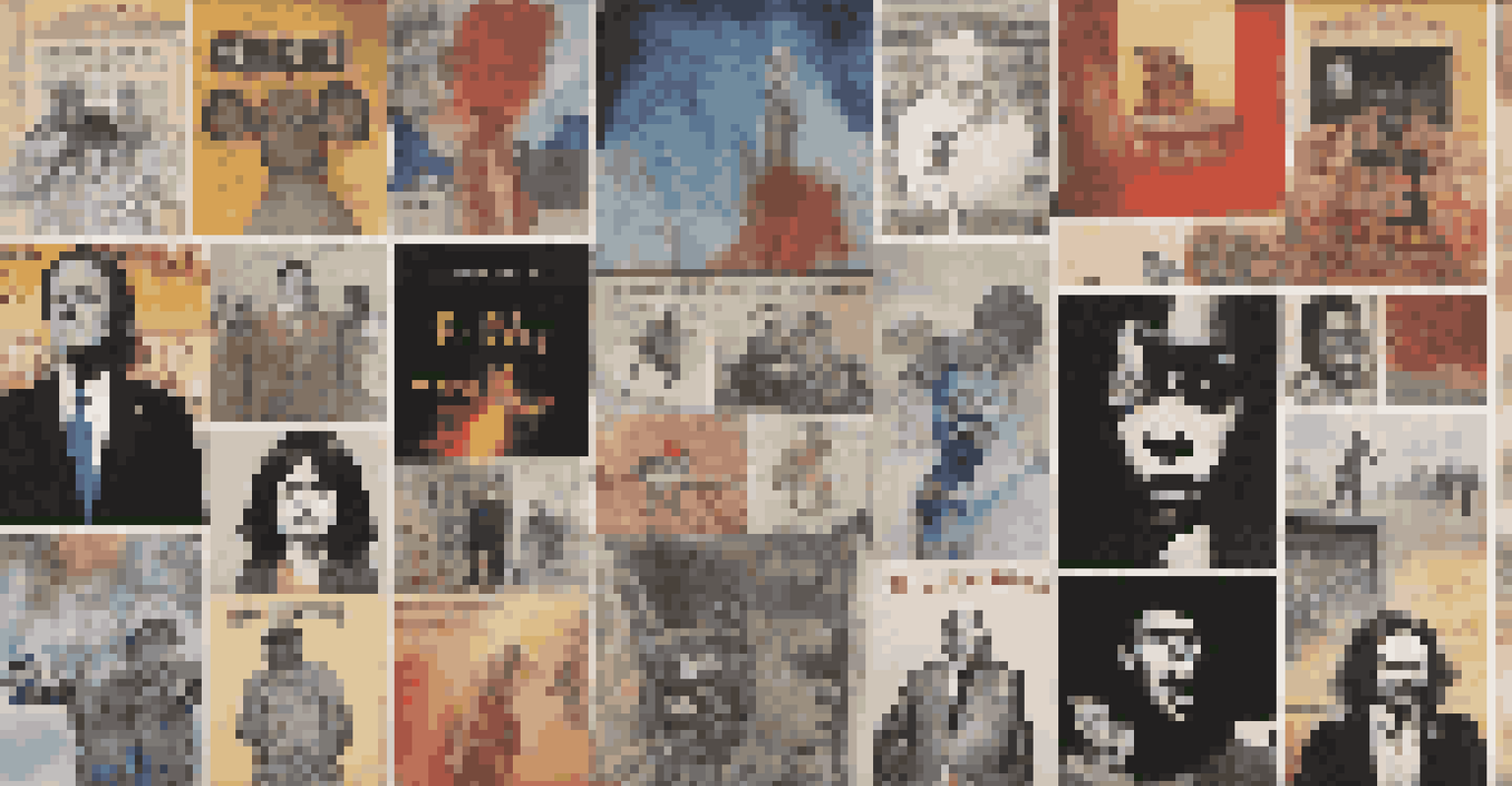The Role of Music in Political Satire and Comedy

Understanding Political Satire in Music
Political satire uses humor to critique politics, often highlighting absurdities and injustices. Music has always been a powerful tool in this genre, allowing artists to convey messages in a memorable way. Through catchy melodies and clever lyrics, musicians can engage audiences while providing commentary on current events.
Music can change the world because it can change people.
For instance, songs like 'Fortunate Son' by Creedence Clearwater Revival have become anthems against war and privilege. Such tracks not only entertain but provoke thought and encourage listeners to reflect on societal issues. This blend of humor and music creates a unique platform for political discourse.
Moreover, using satire in music allows artists to push boundaries in a way that traditional media cannot. The emotional resonance of music helps to amplify the message, making it more impactful. This combination of satire and melody can spark dialogue, influence opinions, and inspire action.
The Historical Context of Music in Political Comedy
Throughout history, music has played a vital role in political commentary, from folk songs of social movements to protest anthems. In the 1960s, for example, artists like Bob Dylan used their music to challenge the status quo, becoming voices for change. This tradition continues today, as musicians leverage their platforms to address pressing issues.

The evolution of political comedy has also been influenced by music; shows like Saturday Night Live often incorporate musical sketches that satirize politicians and policies. These performances not only entertain but also serve as a critique of the political landscape, making complex issues more accessible to viewers. In this way, music enriches the comedic experience.
Music as Political Commentary
Political satire in music uses humor and catchy melodies to critique societal issues and engage audiences.
Additionally, the blending of music and comedy allows for a diverse range of expressions. From parodies to original compositions, artists can tackle various themes, making political commentary more relatable and engaging. This historical synergy continues to shape modern political satire.
Key Elements of Musical Satire
Musical satire often relies on specific techniques to effectively communicate its message. One key element is parody, where existing songs are reimagined to highlight political themes or criticize public figures. This familiar structure allows audiences to connect with the content on a deeper level, as they recognize the original tune.
The job of the artist is to make the revolution irresistible.
Another important element is irony, which is often employed to expose contradictions in political rhetoric. By juxtaposing serious topics with upbeat melodies or humorous lyrics, artists create a dissonance that encourages listeners to think critically. This technique can disarm audiences, prompting them to reconsider their views.
Moreover, the use of repetition in musical satire reinforces key messages, making them more memorable. Catchy hooks and choruses can enhance the effectiveness of political commentary, ensuring that the message lingers long after the song has ended. This combination of elements makes musical satire a powerful tool for social critique.
Modern Examples of Music in Political Satire
In recent years, artists like Childish Gambino with 'This Is America' have highlighted social justice issues through thought-provoking lyrics and striking visuals. The song critiques gun violence and racism, using music as a vehicle for powerful commentary. Such modern examples demonstrate how artists continue to push boundaries and engage audiences.
Similarly, artists like The Lonely Island use humor and satire to address political themes, often blending catchy beats with absurd scenarios. Their comedic approach allows them to tackle serious subjects in a lighthearted manner, making complex issues more digestible. This kind of musical satire resonates with younger audiences, who appreciate humor in activism.
Social Media Amplifies Impact
Platforms like social media enhance the reach of musical satire, enabling artists to engage with global audiences and spark important conversations.
These examples illustrate the ongoing relevance of music in political satire. By adapting to contemporary issues and utilizing innovative styles, musicians continue to play a crucial role in shaping public discourse and encouraging political engagement.
The Role of Social Media in Amplifying Musical Satire
Social media has revolutionized the way musical satire is shared and consumed. Platforms like Twitter, Instagram, and TikTok allow artists to reach a global audience instantly, making it easier for political commentary to go viral. This accessibility empowers musicians to engage with fans and spark conversations around important issues.
For instance, satirical songs often gain traction on social media, leading to increased visibility and engagement. Memes and short clips can spread quickly, amplifying the original message and encouraging others to participate in the dialogue. This democratization of content allows for more voices to be heard in political discussions.
Moreover, the interactive nature of social media encourages collaboration among artists, fans, and activists. This collective engagement can lead to powerful movements and initiatives, as people come together to advocate for change. In this way, social media enhances the impact of musical satire, creating a dynamic platform for political expression.
Impact of Music on Public Perception of Politics
Music has a profound ability to shape public perception, particularly in the realm of politics. When artists create satirical pieces, they can challenge mainstream narratives and sway public opinion. This influence is particularly evident during election cycles, where songs can resonate with voters and reflect the sentiments of the times.
For example, during the 2008 election, songs like 'Yes We Can' by will.i.am became rallying cries for Barack Obama's campaign, illustrating the power of music in mobilizing support. These anthems not only inspire action but also foster a sense of community among supporters, making political engagement feel more accessible.
Future Trends in Musical Satire
The evolution of technology and global collaboration will shape the future of music in political satire, blending tradition with innovative expression.
Furthermore, the emotional connection that music evokes can lead to lasting impressions. When people hear a song that resonates with their beliefs, it can reinforce their views and encourage them to take a stand. Thus, the impact of music on public perception is an essential aspect of political satire and comedy.
Future Trends of Music in Political Satire
As society continues to evolve, so too will the role of music in political satire. The rise of new technologies, such as augmented reality and virtual reality, could allow artists to create immersive experiences that engage audiences in unprecedented ways. This innovation could further blur the lines between entertainment and activism.
Moreover, as global issues become more interconnected, we may see a rise in cross-cultural collaborations. Artists from different backgrounds could come together to address shared challenges, enriching the political dialogue through diverse perspectives. This trend could lead to a more inclusive and comprehensive approach to musical satire.

Ultimately, the future of music in political satire will likely involve a blend of tradition and innovation. As artists continue to adapt their messages to reflect contemporary issues, the power of music as a catalyst for change will remain vital in shaping public discourse.